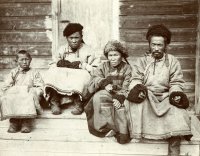 We are presenting to the readers' attention some excerpts from Laws on marriage and family, which are kept in the Central State Archive of Republic Tyva. We are presenting to the readers' attention some excerpts from Laws on marriage and family, which are kept in the Central State Archive of Republic Tyva.
Section I. About marriage.
Paragraph 1. Any woman and man can become man and wife according to their wish.
Note. Even though parents and relatives prepare the dowry and such, and organize the wedding celebrations, they should not go against the wishes of their children and should not use force towards them.
Paragraph 3. If a husband or wife for some reason separate from the family and are not heard from for a year, after the passage of one year it is permitted to marry another spouse. However, if there are children, the term is 3 years.
Paragraph 4. Those under 16 years of age cannot get married.
Paragraph 5. It is not allowed to marry a relative up to the 3rd generation of relatedness.
Paragraph 7. Even though the custom of giving a bride remains, in no case it is allowed to take an excessive kalym (bride price) from poor people, because it would disrupt the marriage. In such cases the guilty will be prosecuted.
Paragraph 9. Any man or woman who invades the family life of another family, breaks up, disrupts the household or seduces one of the spouses to a divorce will be prosecuted to the full extent of the law.
Section II. About divorce.
Paragraph 10. A husband and wife can divorce by mutual agreement.
Paragraph 13. If the spouses cannot come to an agreement as to the division of their assets, it will be performed by the court system. The property is divided equally, but if there are children, they are also divided equally.
Note. It is necessary to calculate accurately the property of the man and wife which they had prior to their marriage, how long they lived together, how they made their living, and the causes of their divorce.
Paragraph 14. If a man and wife without any property divorce, and one of them is incapable of work, the courts will determine how much the spouse which is able to work will pay in alimony to support the other.
Section III. About bringing up children.
Paragraph 17. If a citizen who is keeping a child as a foster parent is not teaching the child to read etc., but only takes it with the aim of exploitation in his own household, such a person will be prosecuted.
Paragraph 18. No citizen has the right to give his children to foreigners to be brought up.
Section IV. Rights of relatives.
Paragraph 20. Children younger than 16 years have to obey and submit to parents in everything.
Note. It is not allowed to permit children to go against existing ideology and order.
Paragraph 21. If children under 18, without the advice of their parents become indebted or commit a crime, the parents are not held responsible.
Section VI. About registration of death and birth.
Paragraph 27. If a citizen finds a child of unknown parentage, he is obligated to report to appropriate organs about the approximate date of birth, and any special identity marks including birthmarks.
Such a person has the right to take the child into his own care or to give the child to another person, or to put it into government child care or other child-care institution.
Photo: Chyrgalan-khelin with family. Photo 1906, N.V.Fedorova.
|
